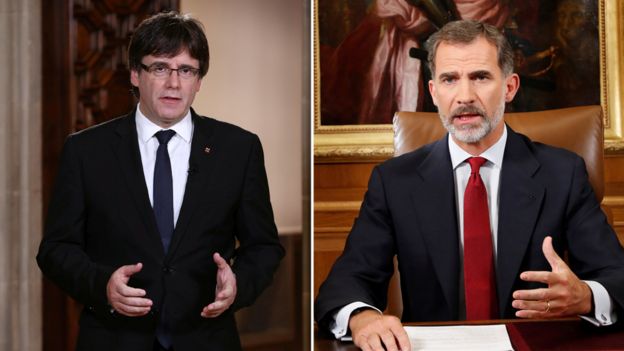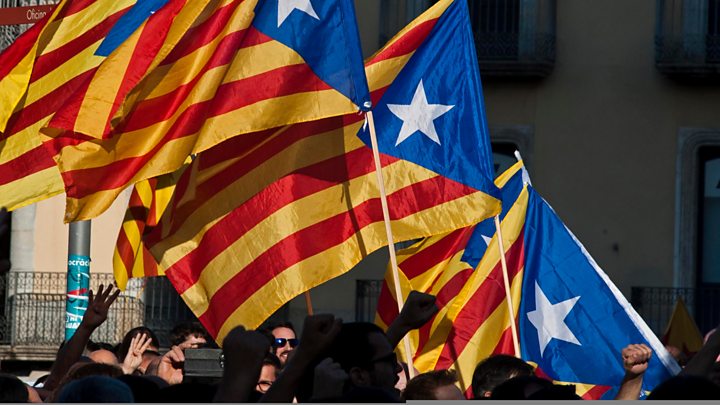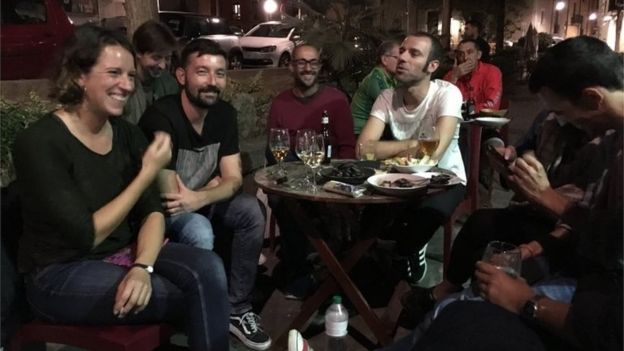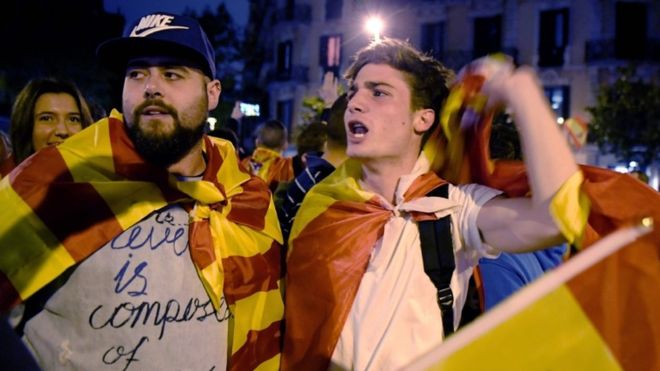CATALONIA vs SPAIN: The David & Goliath Story Reaches A Hair-Raising Crescendo
Catalan crisis: Spain condemns ‘blackmail’ of Puigdemont
BBC
Spain’s government has said it will not accept “blackmail” after the Catalan leader indicated that independence could be declared next week.
Carles Puigdemont must return to the path of law before any negotiation could take place, the Madrid government said in a statement (in Spanish).
His criticism of the king showed he was “out of touch with reality”, it added.
Catalan officials say 90% of those who voted in a disputed referendum on Sunday backed independence.
Organisers put the turnout on Sunday at 42%, with 2.2 million people taking part. But there were several reports of irregularities.
There was violence at polling stations as police, trying to enforce a Spanish court decision to ban the vote, attempted to seize ballot boxes and disperse voters.
The threat that independence could unilaterally be declared is being taken seriously by Catalan businesses.
Sabadell, the fifth-largest bank in Spain, has called an extraordinary meeting of its board on Thursday afternoon to discuss transferring its headquarters out of Catalonia.
 REUTERS – Carles Puigdemont (left) criticised Spain’s King Felipe in his address
REUTERS – Carles Puigdemont (left) criticised Spain’s King Felipe in his address
CaixaBank, an even bigger institution, is mulling a similar move, say reports, which will ensure the banks remain within the eurozone and under the supervision of the European Central Bank.
Some smaller businesses have already decided to move.
King Felipe VI made a TV address on Tuesday night, calling Sunday’s vote illegal and undemocratic.
Mr Puigdemont attacked him for “deliberately ignoring millions of Catalans” and accused the king of adopting the Spanish government’s position.
“This moment calls for mediation,” he said in a televised statement late on Wednesday. He claimed that the king had rejected a moderating role granted to him by the Spanish constitution.
More on the Catalan crisis
- Carles Puigdemont: The man who wants to break up Spain
- Divided loyalties: The couples at odds over independence
- Analysis: Biggest crisis for a generation
- Could Catalonia make a success of independence?
Mr Puigdemont told the BBC on Tuesday that he would declare independence “at the end of this week or the beginning of next”.
The Catalan government has said there will be an extraordinary meeting of parliament on Monday to discuss the outcome of the disputed referendum.

In his statement on Wednesday evening, Mr Puigdemont did not give any further details of a possible declaration of independence.
Switching to Spanish from Catalan, he thanked Spanish citizens who had sent their “solidarity” to Catalonia.
What happened on Sunday?
Nearly 900 people were hurt as police violently tried to enforce a Spanish court order suspending the vote, which the government had declared illegal.
Some police officers were seen firing rubber bullets, storming into polling stations and pulling women by their hair.
Thirty-three police officers were also injured, local medical officials said.
Shocked by what they had seen, hundreds of thousands of Catalans joined street protests on Tuesday. A general strike was also called in protest at “the grave violation of rights and freedoms” seen during the ballot.
- Q&A: Do Catalans really want independence?
- Why Catalan emotions are running high
- How Barcelona and Madrid viewed the vote
Catalan leader’s Game of Thrones
By Patrick Jackson, BBC News, Girona

It was a rare public attack on the Spanish monarch but King Felipe himself, symbol of national unity, seldom addresses the country on TV, and President Puigdemont had to respond.
At a bar in the Catalan leader’s home region, they clapped respectfully afterwards, happy with their leader and his call for mediation, and then they joked about the Game of Thrones TV series.
“We need a king like Jon Snow who tries to keep his lands together and is with the people,” said one woman, laughing.
Prime Minister Mariano Rajoy, by common agreement, was the Night King, wishing eternal winter on Catalonia.
“I want a Spain that cares for all its cultures,” she added more seriously. “Why not love them all? We don’t understand the speech of Felipe VI.”
___
http://www.bbc.com/news/world-europe-41509050
